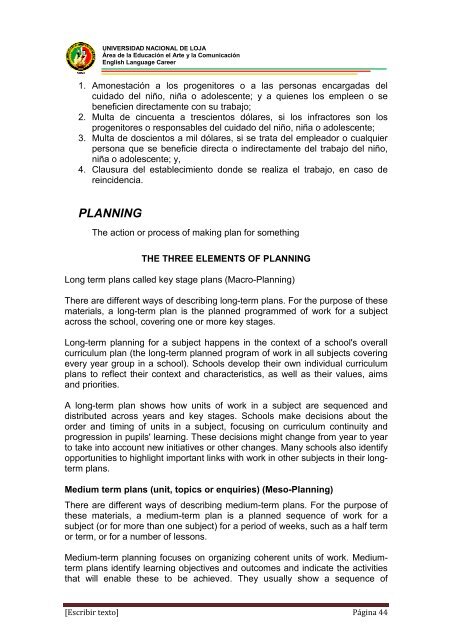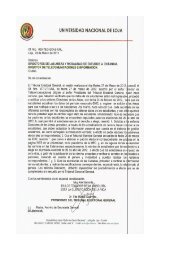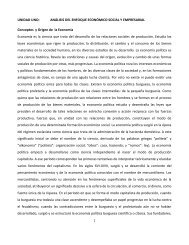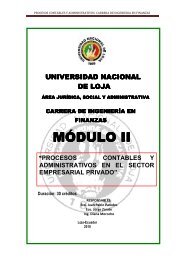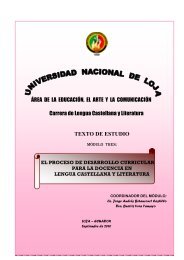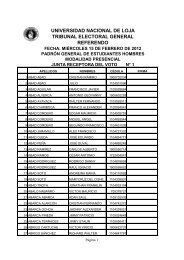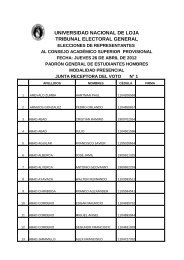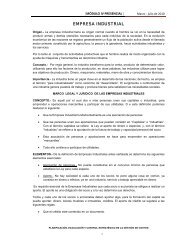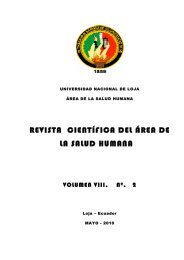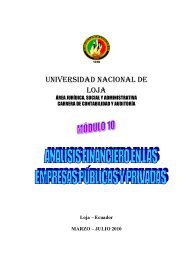module 5 planning of the english language teaching-learning process
module 5 planning of the english language teaching-learning process
module 5 planning of the english language teaching-learning process
You also want an ePaper? Increase the reach of your titles
YUMPU automatically turns print PDFs into web optimized ePapers that Google loves.
UNIVERSIDAD NACIONAL DE LOJA<br />
Área de la Educación el Arte y la Comunicación<br />
English Language Career<br />
1. Amonestación a los progenitores o a las personas encargadas del<br />
cuidado del niño, niña o adolescente; y a quienes los empleen o se<br />
beneficien directamente con su trabajo;<br />
2. Multa de cincuenta a trescientos dólares, si los infractores son los<br />
progenitores o responsables del cuidado del niño, niña o adolescente;<br />
3. Multa de doscientos a mil dólares, si se trata del empleador o cualquier<br />
persona que se beneficie directa o indirectamente del trabajo del niño,<br />
niña o adolescente; y,<br />
4. Clausura del establecimiento donde se realiza el trabajo, en caso de<br />
reincidencia.<br />
PLANNING<br />
The action or <strong>process</strong> <strong>of</strong> making plan for something<br />
THE THREE ELEMENTS OF PLANNING<br />
Long term plans called key stage plans (Macro-Planning)<br />
There are different ways <strong>of</strong> describing long-term plans. For <strong>the</strong> purpose <strong>of</strong> <strong>the</strong>se<br />
materials, a long-term plan is <strong>the</strong> planned programmed <strong>of</strong> work for a subject<br />
across <strong>the</strong> school, covering one or more key stages.<br />
Long-term <strong>planning</strong> for a subject happens in <strong>the</strong> context <strong>of</strong> a school's overall<br />
curriculum plan (<strong>the</strong> long-term planned program <strong>of</strong> work in all subjects covering<br />
every year group in a school). Schools develop <strong>the</strong>ir own individual curriculum<br />
plans to reflect <strong>the</strong>ir context and characteristics, as well as <strong>the</strong>ir values, aims<br />
and priorities.<br />
A long-term plan shows how units <strong>of</strong> work in a subject are sequenced and<br />
distributed across years and key stages. Schools make decisions about <strong>the</strong><br />
order and timing <strong>of</strong> units in a subject, focusing on curriculum continuity and<br />
progression in pupils' <strong>learning</strong>. These decisions might change from year to year<br />
to take into account new initiatives or o<strong>the</strong>r changes. Many schools also identify<br />
opportunities to highlight important links with work in o<strong>the</strong>r subjects in <strong>the</strong>ir longterm<br />
plans.<br />
Medium term plans (unit, topics or enquiries) (Meso-Planning)<br />
There are different ways <strong>of</strong> describing medium-term plans. For <strong>the</strong> purpose <strong>of</strong><br />
<strong>the</strong>se materials, a medium-term plan is a planned sequence <strong>of</strong> work for a<br />
subject (or for more than one subject) for a period <strong>of</strong> weeks, such as a half term<br />
or term, or for a number <strong>of</strong> lessons.<br />
Medium-term <strong>planning</strong> focuses on organizing coherent units <strong>of</strong> work. Mediumterm<br />
plans identify <strong>learning</strong> objectives and outcomes and indicate <strong>the</strong> activities<br />
that will enable <strong>the</strong>se to be achieved. They usually show a sequence <strong>of</strong><br />
[Escribir texto] Página 44


